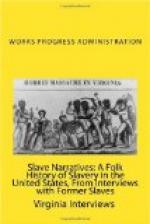“Me? Go’Long! I ain’t no sech cook as my mammy was. But mah boy, he were a fine cook. I ain’t nothin’ of a cook. Yas’em, I cook fo Mis Gallagher, an fo 4 o’ de sheriffs here, up at de jail. But de fancy cookin’ I ain’t much on, no’em I ain’t. But mah boy an mammy now, dey was fine! Mah boy cook at hotels and wealthy homes in Louieville ’til he died.”
“Dey was cotton down dere in Natchez, but no tobacco like up here. No ’em, I nevah wuk in cotton fields. I he’p mammy tote water, hunt chips, hunt pigs, get things outa de col’ house. Dat way, I guess I went to wuk when I wuz about 7 or 8 yeahs ol’. Chillen is sma’t now, an dey hafto be taught to wuk, but dem days us culled chillen wuk; an we had a good time wukin’ fo dey wernt no shows, no playthings lak dey have now to takey up day time, no’em.”
“Nevah no church fo’ culled people does I ’member in Natchez. One time dey was a drouth, an de water we hauls from way ovah to de rivah. Now dat wuz down right wuk, a haulin dat water. Dey wuz an ol’ man, he were powerful in prayer, an gather de darkies unda a big tree, an we all kneels down whilse he pray fo de po’ beastes what needs good clean water fo to drink. Dat wuz a putty sight, dat church meetin’ under de big tree. I alus member dat, an how, dat day he foun a spring wid he ol’ cane, jes’ like a miracle after prayer. It were a putty sight to see mah cows an all de cattle a trottin’ fo dat water. De mens dey dug out a round pond fo’ de water to run up into outa de spring, an it wuz good watah dat wudn’t make de beastes sick, an we-all was sho’ happy.’”
“Yes’em, I’se de only one of mammy’s chillen livin’. She had 11 chillen. Mah gran’na on pappy’s side, she live to be one hundred an ten yeah’s ol’ powerful ol’ ev’y body say, an she were part Indian, gran’ma were, an dat made her live to be ol’.
“Me? I had two husband an three chillen. Mah firs’ husban die an lef’ me wid three little chillens, an mah secon’ husban’, he die ’bout six yeahs ago. Ah cum heah to Lebanon about forty yeahs ago, because mah mammy were heah, an she wanted me to come. When ah wuz little, we live nine yeahs in Natchez on de hill. Den when de wah were ovah Mammy she want to go back to Louieville fo her folks wuz all theah. Ah live in Louieville til ah cum to Lebanon. All ah ’members bout de close o’de wah, wuz dat white folks wuz broke up an po’ down dere at Natchez; and de fus time ah hears de EMANICAPTION read out dey was a lot o’ prancin ’roun, an a big time.”
“Ah seen soldiers in blue down there in Natchez on de hill, oncet ah seen dem cumin down de road when ah were drivin mah cows up de road. Ah wuz scared sho, an’ ah hid in de bushes side o’ de road til dey went by, don’ member dat mah cows was much scared though.” Mammy say ’bettah hide when you sees sojers a-marchin by, so dat time a whole line o dem cum along and I hide.”




